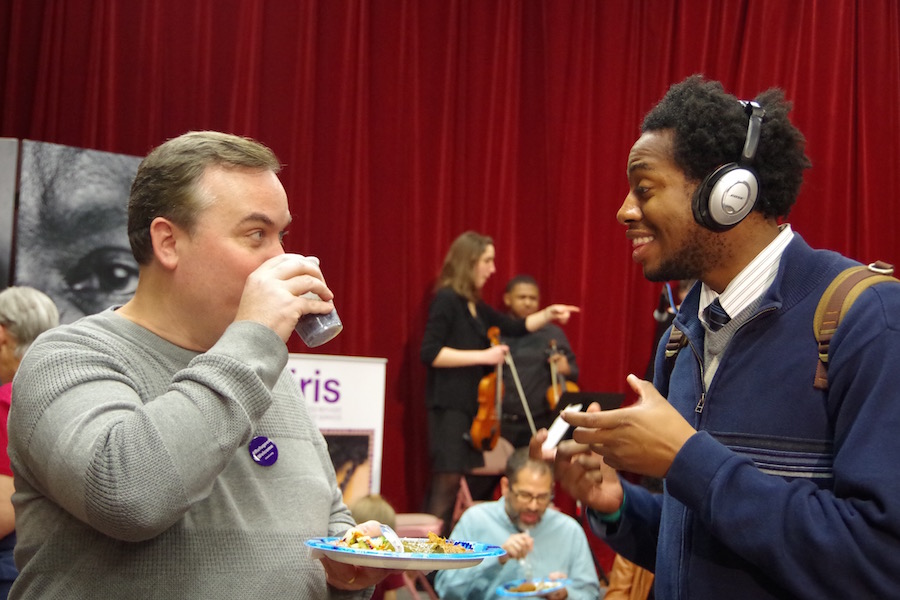
Culture & Community | Economic Development | Hamden | Immigration | Integrated Refugee & Immigrant Services (IRIS) | Refu
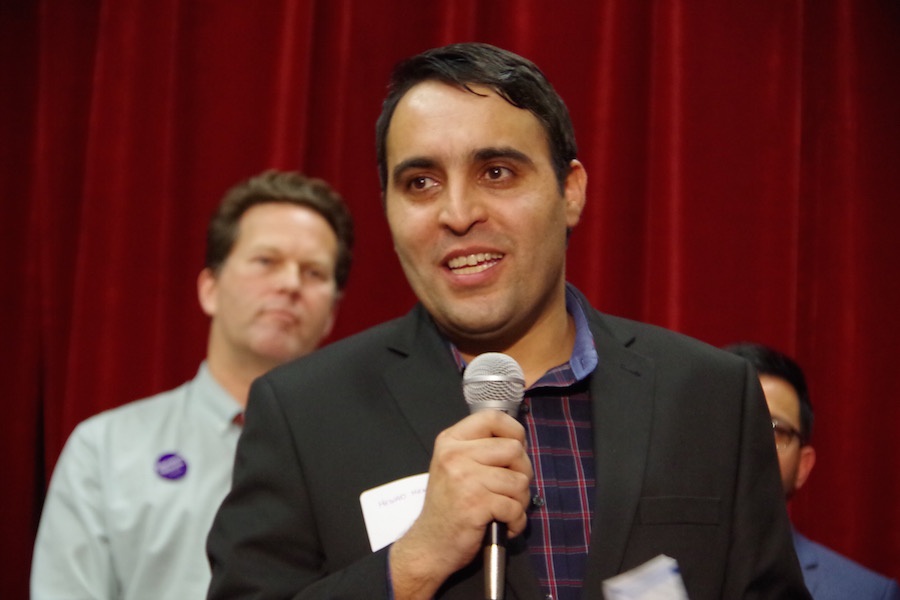 Hewad Hemat, an Afghani who came to the U.S. with his family in 2014, on a Special Immigrant Visa. Lucy Gellman Photo.
Hewad Hemat, an Afghani who came to the U.S. with his family in 2014, on a Special Immigrant Visa. Lucy Gellman Photo.
You’re a recent refugee, who has been vetted for over five years before arriving in the U.S. Now you’re on the plane over. When you arrive, you’ll need a job, and a place to live, and a school your children can attend.
When you arrive, there are two refugee resettlement representatives waiting for you at the airport. And they tell you there’s a town with answers to your questions—Hamden, Connecticut, your first stop on a resettlement journey.
 Alisha Martindale design.
Alisha Martindale design.
Wednesday night, that announcement came at a kickoff and fundraiser for “Hamden Welcomes,” a new initiative between the town of Hamden and Integrated Refugee and Immigrant Services (IRIS).
Held at Spring Glen United Church on Whitney Avenue, the initiative seeks to provide increased housing, education and jobs in Hamden to new refugees. Totals raised were not available at the time of publication.
“Hamden Welcomes” is supported largely by the New Colony Development Corporation (NCDC), a newly incorporated not-for profit arm of the town’s Office of Economic Development. Other collaborators include the town’s Board of Education, Department of Arts & Culture, Spring Glen United Church of Christ, and members of the Hamden and Connecticut labor community.
“Really what it comes down to is you can be upset [about the current political situation], or you can do something active.” said Dale Kroop, Hamden’s director of economic and community development and executive director of the NCDC. “IRIS has a problem in that New Haven only has so much room to take new refugees. We have the civil infrastructure.”
The initiative comes as IRIS finds its resources continually stretched, and Hamden steps in to lend a greater hand than it has in the past. While the town has helped resettle a handful of refugee families in the past two years, it has not been able to offer housing, schools and job support on the same scale as a city like New Haven, which is significantly larger. While New Haven has a population of around 130,000, Hamden has less than half of that at close to 61,000.
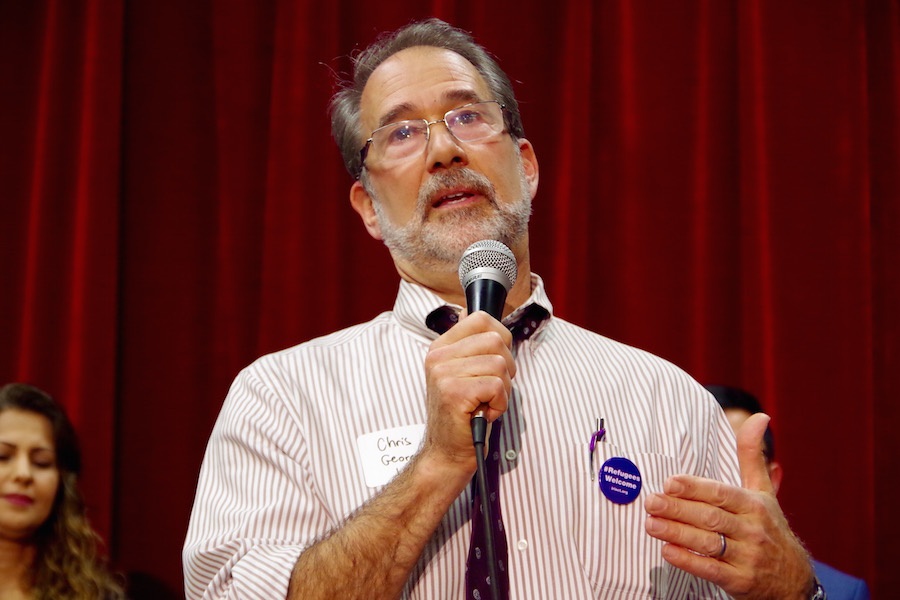 Chris George: It is maybe our finest, most noble tradition.. Lucy Gellman Photo.
Chris George: It is maybe our finest, most noble tradition.. Lucy Gellman Photo.
But assistance from the town has become more necessary as federal funding for refugees is cut and “we’re dealing with a government that just does not support refugee resettlement,” said IRIS Director Chris George. When refugees arrive in Connecticut, they don’t have that much time to find jobs. They’re dealing with new education systems, learning the language, and conducting business in a new country.
“We have to provide these services as quickly as possible,” George said. “It is maybe our finest, most noble tradition. Our best foreign policy, in my book … why would anyone want to mess with this?”
That’s where Hamden comes in: to help with it. Taking the stage with the statement “I feel stupid for moving to Guilford 10 years ago … Hamden is amazing,” IRIS Director of Employment & Education Services Will Kneerim made the pitch for more Hamden jobs, naming current employers like Quinnipiac University, the Clarion Hotel, The Soup Girl, and The Playwright.
“The job … is the key,” he said. “To finding community. To learning more English. To feeling like you’ve got a grip on paying your rent. Paying that heating bill. A future for yourself and your kids.”
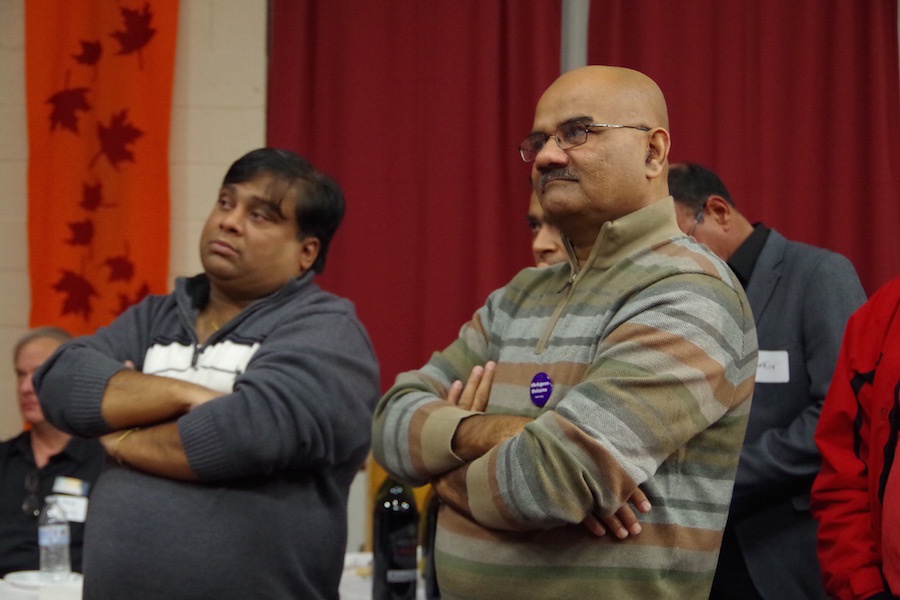 Attendees came wearing purple "Refugees Are Welcome" buttons and inched closer to the stage as remarks were given. Lucy Gellman Photo
Attendees came wearing purple "Refugees Are Welcome" buttons and inched closer to the stage as remarks were given. Lucy Gellman Photo
One by one, city officials pledged to help with that—and more. Speaking on police conduct and outreach, Hamden Police Chief Thomas Wydra pledged his continued support to refugees. He waxed poetic on the state’s Trust Act, which forbids officers to ask persons about their immigration status, and assured attendees that “you matter to us. Immigrants matter to us. So do refugees. Get the word out: You can trust our department.”
In the five years since the act was passed, Wydra said the Hamden Police Department has still struggled with trust in the immigrant and refugee community, with many citizens afraid to report violence, aggravated assault, and sexual or domestic abuse. Encouraging attendees to speak up, Wydra noted that he is looking forward to the partnership, and hopes that it will help perceptions of the police evolve.
On behalf of the state, Department of Labor Commissioner Scott Jackson told the audience that “We are here for you … when you come to our site, we do not give a damn about how you got here. You are here, and you are us.”
That’s already been the story for Bushra Mahdi, a Hamden dressmaker, seamstress and designer who came from Iraq 2014 years ago, after her husband was shot in an attempt on his life. In Hamden, she told attendees, she has been able to watch her kids excel in school and in jobs—her oldest, Maher, was hired by Google last year—while returning to her craft as a dressmaker, a business she had had in Iraq, and rebuilt while working as a tailor for designer Neville Wisdom four years ago.
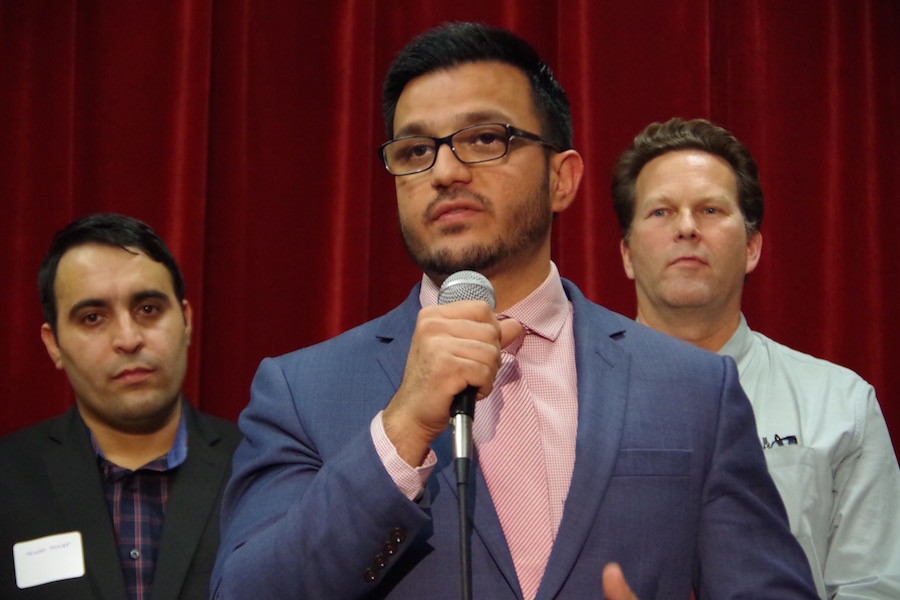 Samir Wakilzada. Lucy Gellman Photo.
Samir Wakilzada. Lucy Gellman Photo.
“This is beautiful,” she said of the event and the new partnership.
Or Samir Wakilzada, a refugee from Afghanistan who arrived in the U.S. 15 years ago. From multiple jobs, he was promoted to General Manager at the New Haven Hotel, . Now, he’s proud to watch as the hotel hires refugees as 80 percent of its employee base, from housekeeping to IT and engineering to front desk service.
And Hewad Hemat (pictured at top), a refugee ambassador for IRIS. In his home of Afghanistan, Hemar worked for 14 years with U.S. Special Forces. But one of his associates was killed, propelling him to apply for a Special Immigrant Visa in 2012. After arriving with his four children in 2014, Hemat held down three jobs, ultimately transitioning to full-time work and full-time community college classes, all while being a full-time parent.
“Refugees are victims to a different kind of violence,” he said. “They are good people.”
“If the president asked me what he should do, I would tell him that he should put pressure on countries that support terrorists, not the people that are running from those terrorists,” he continued. Of the collaboration, he added that “We have a saying—if someone has fallen and you have given them a hand, you will have blessings from God.”
 Sean Grace and Justin Farmer debrief over saffron rice and chicken. Lucy Gellman Photo.
Sean Grace and Justin Farmer debrief over saffron rice and chicken. Lucy Gellman Photo.
While current and prospective politicians were not asked to speak, many were in attendance, including Hamden Mayor Curt Leng, Town Councilman Justin Farmer, and State Reps. Josh Elliott and Robyn Porter.
“I think it’s [Hamden Welcomes] great,” said Porter, milling around the crowd after opening remarks. “I think that people need to feel safe and secure, especially when they’re leaving countries that are being raided and controlled by terrorists. I just think it’s really commendable that the town of Hamden would extend its hand like this, to make sure that not only are they safe and secure, but they have a pathway to education, to employment, to the things that are very critical to start over.”
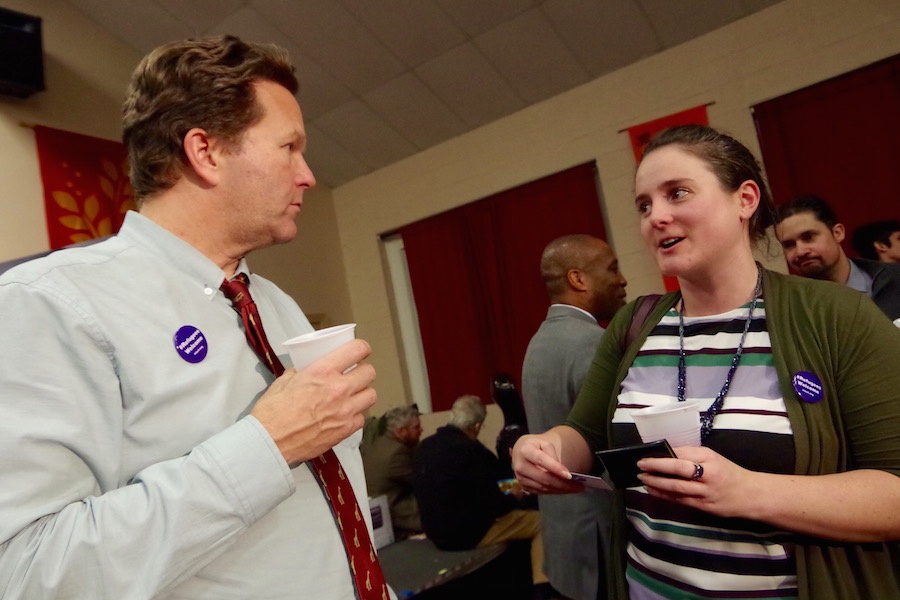
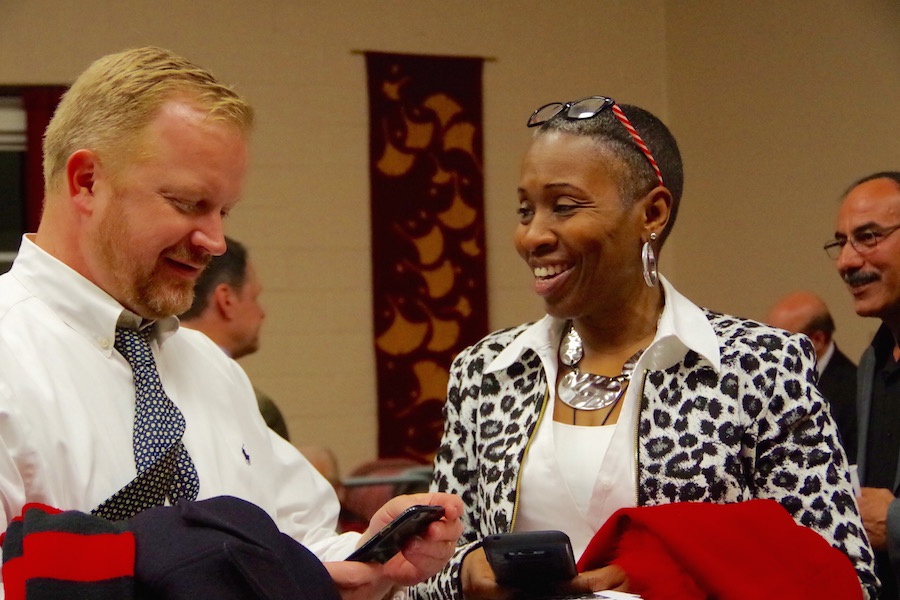
Within the hour, those new partnerships were already forming. In one corner of the room, Verisk insurance salesperson Crystal Cathcart was deep in conversation with Kneerim, seeing if they could set up a lunch date to discuss job placement in the insurance industry.
“The majority of our workforce is aging, so there’s a huge gap in the pipeline,” she said. “It’s a really good career—you meet so many people and you’re out in the community. You don’t need a college degree. It could be a great place for refugees to start.”

